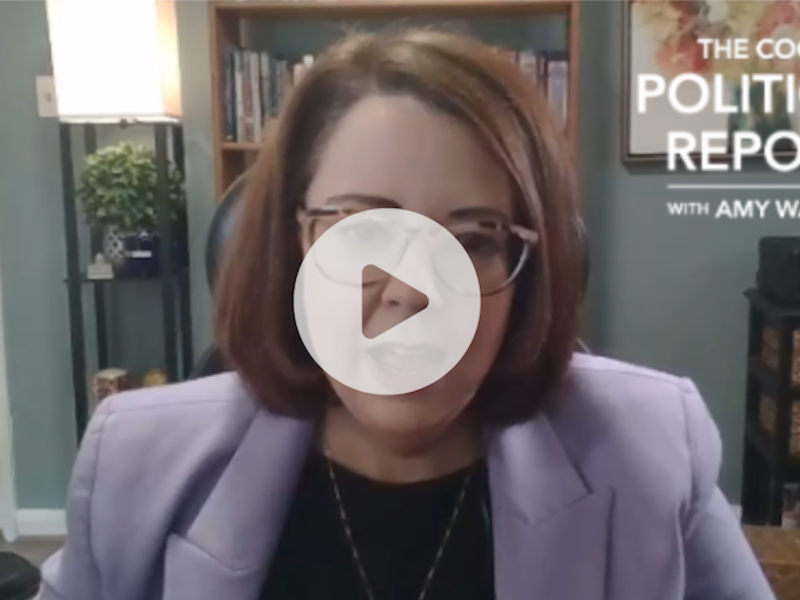
Earlier this week the Democratic SuperPAC Priorities USA released a memo that publicly acknowledged concerns that Democrats had been privately expressing for a couple weeks that Democrats lack a compelling economic narrative for 2018. Citing polling that shows an uptick in President Trump’s approval rating and the tax reform bill, the Priorities memo argues:
“There’s no question that Trump benefits when a critique of his tax and health care policies is not front and center – especially when voters are hearing Trump’s side of the story on the economy. Our polling shows that criticisms of Trump’s handling of the economy are strong and persuasive, but voters must hear them more loudly and clearly than currently is the case.”
During the failed attempt at repealing Obamacare this summer, Democrats benefited from GOP infighting. Trump’s attacks on GOP leaders led Republican voters to sour on the GOP congress. In the tax reform battle, Republicans focused more on process than policy, as they were forced to spend most of their time trying to sell their own members on the bill than selling it to the public. The media lapped up the drama, with cable TV following each and every twist and turn of the sausage making.
By the time the tax reform bill passed Congress, it was more unpopular than any tax bill (including tax hikes) in modern history.
Now, with the drama of legislation over, the media spotlight has turned to the White House scandal, the congressional Russia-memo tussle and fights over immigration. Moreover, impressions of the economy continue to improve. The most recent NBC/Wall Street Journal poll found 69 percent were satisfied with the economy, the highest it’s been since 2000.
Highest percentage of satisfaction with the economy since 2000
Democrats argue that the general guts of the health care and tax law remain unpopular. The Priorities memo, as well as other non-partisan polling, finds that the majority of Americans believe that the new tax law will benefit the wealthy more than the middle class.
But, with daily economic news mostly positive (despite the latest swings of the stock market), earlier Democratic arguments that this bill would cause an “Armageddon” like disaster on the nation’s economy sounds woefully tone deaf. Moreover, Republican-aligned groups have both outspent Democratic groups in messaging on the bill thus far, and have publicly committed to spending millions more in the coming months.
The ad tracking firm Kantar Media estimates that over $15M has been spent on tax reform related TV ads since March 2017. Those promoting the GOP tax plan have outspent those against the legislation by a 2-1 margin — $10M to $5M. American Action Network, the issue-advocacy group underwritten by Speaker Paul Ryan, has been the biggest spender at over $3.4M, while the Democratic-aligned “Not One Penny” coalition has spent $1.2M.
There have been a lot of comparisons between the tax bill sales job and that of Obamacare in 2009-10. Back in 2009, the pro-Obamacare forces were more aggressive on the air than those opposed to it. According to data provided by Kantar Media, between June 2009 and passage of the bill in March 2010, 57 percent of all ads aired were ones with a pro-Obamacare message: 37,409 pro-Obamacare ads compared to just 27,533 opposed to the legislation. But, once the bill passed, those who supported the legislation let off the gas while those opposed to it, put the pedal to the metal. Between April and November of 2010, there were 377,000 TV ads broadcast that mentioned Obamacare, of those 94 percent — or 355,000 of them, were anti-Obamacare.
Republicans relentless and disciplined attacks on the new law were effective in helping to define the 2010 elections as a backlash to Obamacare. Of course, that was back in the olden days, when there wasn’t a new scandal or drama for the media to cover every 10 minutes. Breaking through the noise — keeping focused on message — is harder than ever. For their part, however, Democratic candidates have kept their focus on attacking the tax law and not getting caught up in the drama. For example, in the special election for the GOP-leaning PA-18, Democratic nominee Connor Lamb has attacked the new law in ads as a deficit buster and that the tax cut it provides “will be wiped out by higher health care premiums.”
For all the happy talk by Democrats about solid fundraising in Congressional and Senate races, that advantage may not matter if they lose the narrative about the economy. A combination of an improving economy and getting drastically outspent in defining the new tax law can help Republicans reset the terms of the debate before the races get engaged this fall.










Subscribe Today
Our subscribers have first access to individual race pages for each House, Senate and Governors race, which will include race ratings (each race is rated on a seven-point scale) and a narrative analysis pertaining to that race.